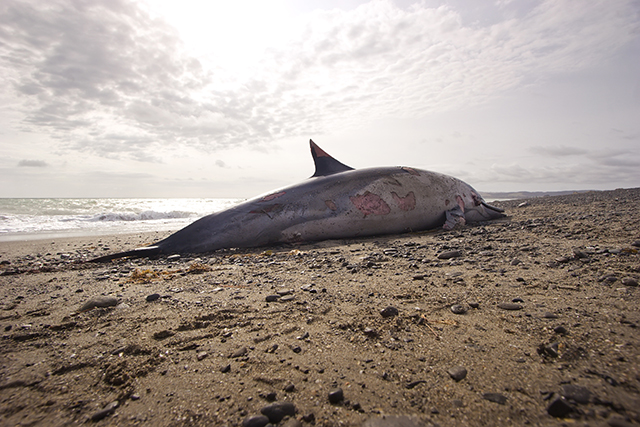Gruesome photos of dead dolphin highlights the unresolved plastic problem along Britain’s coastline
12/02/2019 / By Edsel Cook

Plastic pollution in the ocean has claimed yet another marine animal as a victim – and in a particularly disturbing way. Gruesome images of a dead dolphin on a beach in Cornwall, U.K. reminded everyone of the deadly threat posed by plastic trash to marine life.
Cornish local Simon Heester called in the incident. He reported that he found the decomposing carcass ensnared in plastic rope. The animal also appeared to have swallowed plastic trash.
The dead dolphin washed ashore on Pentewan beach near St. Austell, Cornwall. It is the 31st — and the latest — instance that an animal is found dead in the Cornish region in 2019.
Other carcasses ended up in Par, Porthtowan, and the Rame Peninsula. All of the dolphins displayed signs of injury from ingesting small plastics or getting entangled in larger pieces of plastic trash.
Marine Stranding Network official Ruth Williams explained that the high number of dead dolphins ending up on U.K. beaches might seem shocking to most people. However, the incidents were not uncommon, especially in recent years as more plastics filled the seas. (Related: Plastic pollution threatens the food supply from the world’s oceans.)
Bearing the marks of plastic trash, dead dolphins litter U.K. beaches
Environmental groups like Rame Peninsula Beach Care described earlier instances of the dead dolphins as “heartbreaking.” In one incident, paddle-boarders got a bad surprise when they bumped into a dead calf drifting off the shore of Kingsand, Cornwall.
Another carcass arrived at the shores of Long Rock in Penzance. The once-powerful tail of this dolphin sported a plastic tie that it failed to shuck.

“I was walking the coastal path this morning when I saw the poor thing,” commented Newlyn native Dee Kellow, who took photos of the dead dolphin in Penzance. “It’s so sad.”
The snout of yet another dead dolphin – this one found in Jersey – got trapped in a plastic ring. The plastic trash might have prevented the animal from getting enough nutrition.
The Environmental Audit Committee recently spoke up about the staggering amounts of fertilizer runoff, heavy metals, plastic trash, and untreated sewage that entered the ocean each year. The U.K. Parliament committee stressed that the country needed to work harder at stopping plastic pollution from going down the drain into sewers, rivers, and eventually the ocean.
Plastic pollutants ranged in size from tiny microbeads and microfibers to massive nets. Whatever their size, they proved deadly for marine life and ecosystems.
Urban flooding flushed microplastics into the oceans faster than predicted
Researchers from The University of Manchester investigated plastic pollution in U.K. rivers. They warned that urban floods dumped microplastics in the environment at a faster rate than previously predicted.
They found evidence of plastic particles in every sample they took from waterways in Greater Manchester. Many of the rivers contained an average of 517,000 microplastics per square meter. Even the tiniest streams displayed high levels of microplastic pollution.
The Manchester study broke new ground as the first detailed study performed throughout a catchment. It revealed that microplastics played a large part in the spread of plastic pollution across the oceans.
A microplastic is a tiny piece of plastic trash. It comes in shapes like beads, fibers, and fragments of larger plastics. Domestic sewage, industrial wastewater, and stormwater drains dumped these tiny plastics into natural rivers.
The researchers collected samples from 40 sites around Manchester. They found high concentrations of microplastics in every waterway.
After floods swept through the Greater Manchester catchment, the researchers took new samples from the sites. They found that microplastic levels dropped in most of the waterways. The floods carried off 70 percent of the microplastics trapped in the riverbeds. (Read Microplastics.news for more reporting on this topic.)
Sources include:
Submit a correction >>
Tagged Under:
This article may contain statements that reflect the opinion of the author





















